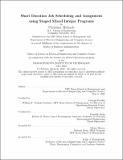| dc.contributor.advisor | Perakis, Georgia | |
| dc.contributor.advisor | Amin, Saurabh | |
| dc.contributor.author | Michaels, Christina | |
| dc.date.accessioned | 2022-11-30T19:42:44Z | |
| dc.date.available | 2022-11-30T19:42:44Z | |
| dc.date.issued | 2022-05 | |
| dc.date.submitted | 2022-08-25T19:15:37.281Z | |
| dc.identifier.uri | https://hdl.handle.net/1721.1/146708 | |
| dc.description.abstract | As part of large-scale digital transformation efforts, Atlantic Utility’s electric field force recently introduced a mobile work dispatch solution aimed at reducing inefficiencies associated with daily work. The application retired many of the manual, paper-based processes previously employed by field crews and supervisors to complete daily short-cycle (<6 hrs) jobs; it also introduced new capabilities that allow super- visors to review accumulated jobs in their operational region and strategize for their completion. Current operations find supervisors left with a long list of jobs to sift through when attempting to make daily work assignments and when scheduling work for one or more days in the future. Application users must manually identify jobs to schedule or assign while considering the distance to the job, required completion date, duration, and other factors. These factors contribute to the job priority level but without a simple way to aggregate these considerations into a clear set of prioritized jobs, supervisors are challenged to identify which work packets are highest priority and should be completed first. Daily scheduling and assignment is further complicated by the trade-off supervisors face when determining how to balance reduction of accumulated historical jobs with new jobs coming in at variable rates.
This thesis formulates two proof-of-concept mixed integer programs that perform staged scheduling and assignment of short duration jobs. The objective functions include use of a metric indicative of a job’s total number of days past due or coming due. In this way, the formulations incorporate the real world trade-off supervisors face between historical and newly-created jobs subject to constraints on daily crew availability, increasing their utility as a future in-app aid for supervisors. Results of the scheduling stage over 2- to 6-day planning horizons indicate increased backlog reduction in comparison to naive or random strategies. Variation of user-defined inputs shows the scheduling formulation can be tuned to prioritize either jobs past due or those coming due in greater proportions, subject to the preferences of individual supervisors. When using both scheduling and assignment stages in sequence, results over 1- and 3-month simulated trials show consistently better performance in reducing job accumulation in comparison to historical records observed across operational barns of varying sizes.
These results provide justification for a full operational pilot and recommendations for how to deploy production-ready algorithms are included in this thesis. They also suggest that greater improvement in barn operations is possible without assumption of increased crew capacity. Use of the staged formulations in the mobile work dispatch solution could introduce greater uniformity in how short duration jobs across the Atlantic Utility network are prioritized and completed, and may lead to enhanced customer service. These improvements could be realized through incorporation of these formulations as an automatic in-app aid to supervisors and field crews. Further, application of the staged approach to workforce allocation can be considered in industries outside utilities including those that involve logistics and delivery operations. | |
| dc.publisher | Massachusetts Institute of Technology | |
| dc.rights | In Copyright - Educational Use Permitted | |
| dc.rights | Copyright retained by author(s) | |
| dc.rights.uri | https://rightsstatements.org/page/InC-EDU/1.0/ | |
| dc.title | Short Duration Job Scheduling and Assignment using Staged Mixed Integer Programs | |
| dc.type | Thesis | |
| dc.description.degree | M.B.A. | |
| dc.description.degree | S.M. | |
| dc.contributor.department | Massachusetts Institute of Technology. Department of Electrical Engineering and Computer Science | |
| dc.contributor.department | Sloan School of Management | |
| mit.thesis.degree | Master | |
| thesis.degree.name | Master of Business Administration | |
| thesis.degree.name | Master of Science in Electrical Engineering and Computer Science | |
